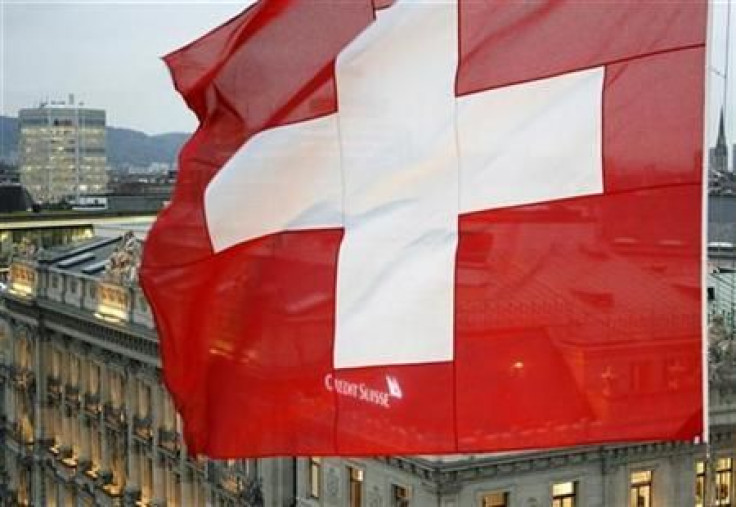Switzerland May Soon Have World’s Highest Minimum Wage: Nestle, Trade Groups Say Hike Would Hurt Swiss Economy
The wage battle reflects those happening elsewhere in Europe and the U.S.

Switzerland, known for its high standard of living and superb watchmaking prowess, may soon claim another superlative as the country with the highest minimum wage if labor advocates get their way in the face of fierce opposition from the business community.
On May 18, Swiss voters will decide a referendum that would create a national minimum wage of 22 Swiss francs ($24.99) per hour, or 4,000 francs per month. If approved, the measure would give Switzerland the highest minimum wage in the world. The initiative was proposed by SBG, the country’s largest trade union, with support from the Swiss Socialist Party. Switzerland currently has no minimum wage written into law, but about 90 percent of Swiss workers already make more than 4,000 francs ($4,538) per month. Supporters of the measure say the minimum wage will help elevate the country’s 330,000 mostly female low-wage workers who struggle to make ends meet in the high-priced country.
Despite what appears to be a minimal potential impact on the economy, the proposal has been getting plenty of pushback from economists, trade groups and businesses, including Nestlé S.A., a multinational food and beverage giant and one of Switzerland’s largest companies. Philippe Aeschlimann, corporate spokesman for Nestlé, said all of its Swiss employees are already paid above the minimum annual wage proposed in the initiative. However, he said the higher labor costs would negatively affect other companies in Nestlé’s supply chain.
“The proposed federally mandated minimum wage is considerably higher than those of neighboring countries and would not take into consideration regional and sectorial differences,” Aeschlimann told International Business Times in an email. “It would therefore disadvantage Swiss-based companies, which would negatively impact the Swiss economy.”
Nestlé is not alone in its argument. The proposed hike would bring Switzerland’s minimum wage to more than twice that of neighboring Germany, which recently introduced a minimum wage of 8.50 euros ($11.75) per hour. The huge disparity, opponents say, could force businesses to flee Switzerland for cheaper locales. In a strongly worded statement, Allpura, a trade group for Swiss-based cleaning companies, said that the wage hike would “destroy jobs and weaken the competitiveness of Switzerland.”
Johann Schneider-Ammann, Switzerland’s economy minister, also opposes the measure, saying it could threaten several industries, such as retail, agriculture and housekeeping, thereby hurting the low-wage workers it’s designed to help. In February, Schneider-Ammann launched a campaign encouraging voters to reject the initiative, the Local reported.
Switzerland often ranks at or near the top of standard-of-living indexes, but it’s also among the priciest nations in Europe. Last year, the European Free Trade Association ranked it the second most expensive country in terms of cost of living, just behind Norway. But while the superlative aspect of the world’s highest minimum wage has helped Switzerland’s wage battle gain a degree of national attention, the minimum-wage arguments there reflect those elsewhere in Europe and the United States. This year, the minimum wage in SeaTac, Wash., was raised to $15 an hour, the highest in the country. The hike was seen largely as an experiment, but it also sparked a national dialog about much-needed cost-of-living salary increases, which have failed to keep up with inflation over the last few decades. And the idea is already spreading. This week, the advocacy group 15 Now filed paperwork for a voter referendum that would bring the $15-an-hour minimum wage to Seattle, King 5 TV reported.
In each case, opponents have claimed that small and mid-sized businesses would flee to other parts of Washington, or out of the state completely, but according to a report this month from Puget Sound Sage, those fears are unfounded. To make its point, the group cited a 25 percent minimum wage increase in San Jose, Calif., in 2013, which not only did not result in businesses fleeing the city, but it was followed by a 3 percent increase in registered businesses.
In Switzerland’s case, whether or not the country will ultimately claim the title of world's highest minimum wage is still very much an open question. According to Bloomberg, voters are split, with one poll released last week showing that 52 percent of voters are likely to reject it.
Got a news tip? Email me. Follow me on Twitter @christopherzara.
© Copyright IBTimes 2024. All rights reserved.












